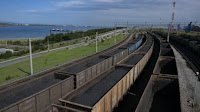Repeated US bombardments on Houthis positions have done
little to stop the group that has managed to employ advanced weapons like
surface-water drones and anti-ship ballistic missiles to fluster US troops. They
have kept up the pace of attacks with more than 190 drone and missile launches
since the effort began in October 2023.
While the US has thwarted most Houthi attempts to damage
merchant ships, the Yemeni fighters have now sunk or heavily damaged at least
four commercial vessels, along with hijacking one. They have also killed four
commercial sailors.
The latest successful attack came on June 23, when the
Houthis struck the Liberian-flagged and Greek-owned merchant ship the Trans
World Navigator. The last vessel to sink, another Greek-owned ship, the Tutor,
was on June 12.
Bruce Bennett, an adjunct senior international defense
researcher at RAND Corporation, said the Houthis are being fed by religious
determination and a political motivation that embraces sacrifice, while their
insurgent warfare, with weapons scattered across Yemen, pose a big
challenge.
“The US military is designed for regular warfare. It’s
designed to take out an adversary who’s out there and targetable,” he said.
“It’s really a very hard kind of military threat to get under control.”
The conflict’s impact on global trade is only growing as it
drags on. Earlier this month, the shipping industry sent out a scathing
condemnation of the Houthis attacks, calling it “an unacceptable
situation” and pushing for stronger international action to ensure the attacks
“stop now.”
While economic costs have largely been absorbed by the
shipping industry and direct sellers for now, that could change.
Adnan Mazarei, a nonresident senior fellow at the Peterson
Institute for International Economics who focuses on the economies of the Middle
East and Central Asia, said traffic is down by 50% in the Red Sea corridor. The
impact is regional, he added, mainly hitting Egypt, which collects shipping
revenues through the Suez Canal, along with reducing port traffic for countries
like Israel.
An extended conflict could begin to impact other parts of
the world, especially Europe, as increased shipping costs trickle down to the
average consumer. That could significantly worsen if a possible
approaching war between Israel and Hezbollah in Lebanon is realized,
Mazarei added.
“Unless there is a war in Lebanon, we are in a somewhat
stable situation” he said. “Not a good situation, but I think things are
somewhat stabilized.”
The Houthis are launching drones and missiles daily from
sites in Yemen, using fishing boats for radar-tracking and relying on advanced
weapons shipments and other targeting assistance from Iran.
The scope of their efforts has also expanded outside of the
maritime corridor, with the Houthis in the past few months kidnapping dozens of
United Nations relief works, Human Rights Watch said in a new report.
The US Navy has been constantly on the alert since full
engagement began in January to quickly shoot down drones and launch
counterattacks on the rebel group’s assets.
But the Houthis need to slip just one drone or missile
through defenses to do damage, while the U.S. cannot miss once or risk a hit,
said Cmdr. Eric Blomberg with the USS Laboon, a destroyer ship that has taken
on the Houthis, who told The Associated Press that people may be
unaware of “how deadly serious it is what we’re doing and how under threat the
ships continue to be.”
The USS Eisenhower aircraft carrier strike group, made up of
four ships and some 6,000 sailors, this month left the Middle East. The US is
sending reinforcements to the region for the Eisenhower group, which has been
deployed since October to deter regional escalation and counter the Houthis.
Washington believes it can damage the rebels enough to stop
the effectiveness of their campaign, though officials are now stressing the
challenge of accomplishing that goal.
White House national security spokesperson John Kirby told
reporters on Wednesday that the Houthis “miss a whole hell of a lot more than
they hit” because of the Navy’s vigilance.
Kirby explained the U.S. was focused on “taking away their
capability to conduct the attacks” but also acknowledged the Houthis remain
determined and well-supplied, despite the military working to intercept Iranian
skiffs headed to Yemen.
“They have instilled this sort of religious fervorness and
made it some sort of cause célèbre, and when you do that, it becomes even more
difficult,” he said. “We’re doing everything we can to try to degrade their
capabilities, but they’re still getting supplied. They’re still getting
resourced by Iran.”





















